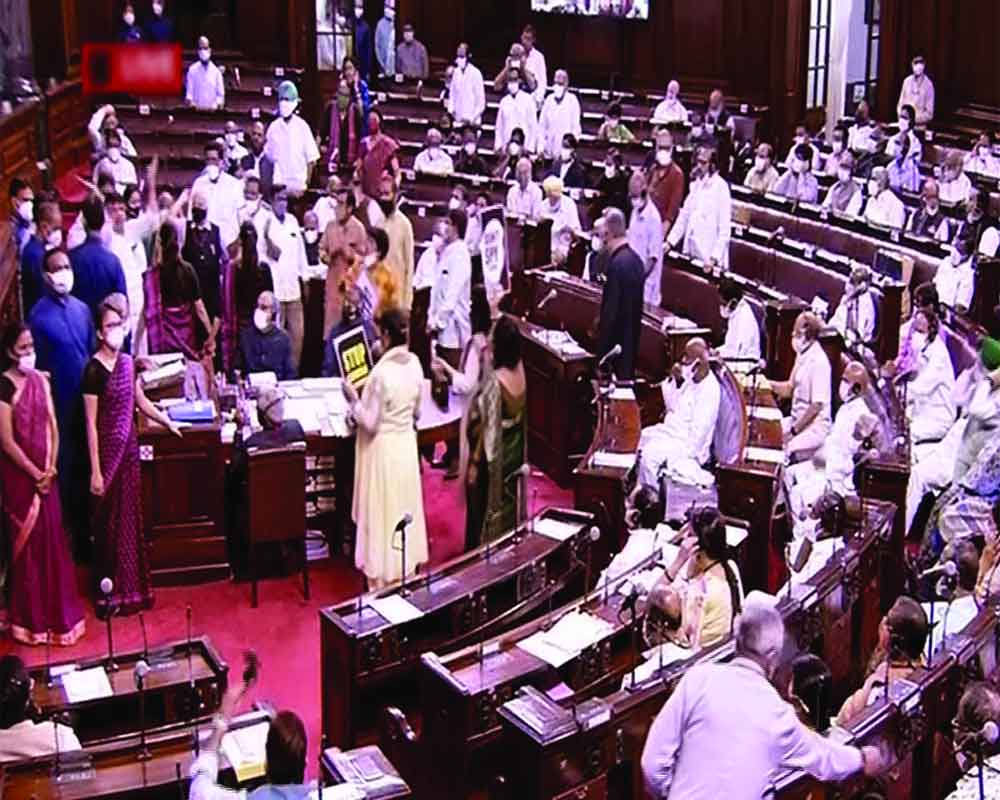This negativity manifests itself in various ways, including the manner in which the Houses of Parliament and Assembly sessions are disrupted
It’s election time in five States, and both the print and electronic media enjoy it in many ways. Even the international media focus has shifted to these polls, primarily because of Uttar Pradesh and its Chief Minister Yogi Adityanath. He has impressed even his staunch opponents — they admit it only in private — by ruthless action against criminals. There could be considerable substance in assertions that not only internal opposition, but also certain external elements would like him to be out as his victory would herald a death knell for the mafia, and that would include illegal offshore money transactions and devious funding to NGOs known to use it for unacceptable tasks. People are well aware of several other factors why there is so much interest all around in Yogi. There is a flood of surveys on the electronic media, and each one of these claims to be most accurate, with a wonderful record of making right predictions in the past elections. Switch over to the next channel, and they would be engrossed in the ‘biggest’ debate on UP elections!
Elections cast a shadow over every important issue facing people and the nation. And this happens rather every year, somewhere or the other. India has now enough experience on how elections drain the nation’s time, energy and resources, and impede developmental plans and programmes. There is a time-tested alternative: All elections are held simultaneously after five years. It is unfortunate that this is being opposed for narrow political aspirations. It was expedient on the part of media and an ideologically unconstrained civil society to deliberate upon such issues in depth and detail. Unfortunately, civil society appears in public through media only in the context of issuing certain statements that clearly reflect their bias. In fact, frivolous acts like award waapsi generate little confidence among people as such acts are a mere manifestation of negativity that emerges out of the frustration generated when certain individuals lament the loss of being in the driver’s seat.
This negativity manifests itself in several ways, including the way the Houses of Parliament and Assembly sessions are disrupted. All this is certainly not congenial for the health of a vibrant democratic setup which every alert, active and concerned Indian aspires for. The manner Parliament’s November-December 2021 session suffered adjournments and expressions of bitterness, does not harmonise well with the global expectations from India. The India of yore was revered globally for its tradition of exploring the secrets of nature through dialogical pedagogy: Prashna, Prati-Prashna, Pari-Prashna! It appears our parliamentarians have just decided to ignore it. They are not willing to sit together calmly, discuss the national and international issues and take decisions in the interest of people, the prestige of India and its global standing. This is what they did in the Constituent Assembly, presided over by a luminary of the stature of Dr Rajendra Prasad. Who is not familiar with the worrisome descent into the politics of negativity? Should the Indian education system not take responsibility for its failure in equipping the decision/law makers with empathy for the weak and poor, respect for divergent views and ingenuity to forge a solution from amongst conflicting views?
In a democracy, differences arising out of ideological convictions deserve respectful attention of those in power. When it comes to a calamity like Corona, or the cowardly killing of 40 CRPF jawans in Pulwama on February 14, 2019, it was shocking indeed to find statements of certain Indian leaders praised in Pakistan. Yes, their stand was a definite endorsement of Pakistan’s stand. It was in sharp contrast to the Opposition’s approach to the Pakistani attack on November 26, 2008, that killed 209 innocent Indians. One recalls the best example of the Government, Opposition and the entire people coming together as in the 1971 war. From there to Pulwama to Balakot surgical strike of 2019 is a story of sharp deterioration in the comprehension of the Opposition’s role.
Take another case which, though of a different dimension, has serious implications not only for the wellbeing of every Indian but also for India’s social cohesion and religious amity. The CAA-NRC protests caused immense hardships to millions of people daily, led to a violent communal clash that killed over 50 innocent people. It was a scar on India’s record of social cohesion. It was followed by the recently concluded farmers’ agitation, which inflicted immense hardships on millions of daily commuters, damaged the livelihood of workers and disrupted industrial activity. Hundreds of nearby villages suffered damages of varied kinds to their earnings, dwellings and routine business. Why should Parliament not call a special session to ponder this unprecedented takeover of public spaces by agitators, ignoring even the Supreme Court’s orders? One is afraid it sets a bad precedent. Parliament needs to sit for extended durations to dwell upon such national concerns that impede the nation’s progress.
We are told the House of Commons has never witnessed such scenes, and has never been adjourned due to disturbances caused by its members. Astonishingly, it has become a routine in our Parliament. If an MP could throw the rule book at the Speaker or Chairperson, how can a schoolteacher find any fault with an adolescent throwing an object to hit his principal? Would it not be unethical to punish him?
(The author works in education, social cohesion and religious amity. The views expressed are personal.)


























